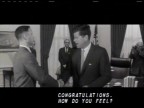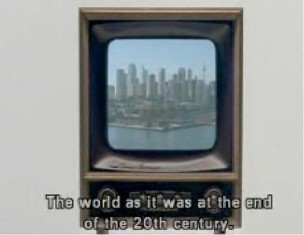A. Close Analysis (Choose 3 13% each)
: Please choose 3 of the following sets of film
stills and/or excerpts, and analyze
1) their meanings, literary/filmic techniques used,
2) their intertext (if any), and
3) their significance in their "contexts." (Context can mean
the text the selected texts are in, as well as their social and textual
contexts)
* To avoid confusion, don't forget to give the numbers of your texts.
* Since you have a lot of texts to choose from, please try to avoid choosing
the same texts in answering different questions.
 |
 |
2. larger
image |
Here's a song for Clara Cruise
A pretty girl who lived her shoes
Redder than a red red rose
The patent leather showed her toes
She fell in love with them on sight
The soles they made her feet so light
The pretty shoes of Clara Cruise
She danced in them throughout the night (Salt Fish Girl 24).
(* You can choose to explain its significance in the first two chapters. For your information, however, this is the song Miranda's mother leaves her after her death. Later, Miranda sells its royalty to a shoe company, despite her promise to her father. )
 |
 |
 |
8.
"We die containing a richness of lovers and tribes, tastes we have
swallowed, bodies we have plunged into and swum up as if rivers of wisdom,
characters we have climbed into as if trees, fears we have hiden in as
if caves. I wish for all this to be marked on my body when I am dead.
I believe in such cartography--to be marked by nature, not just to label
ourselves on a map like the names of rich men and women on buildings.
We are communal histories, communal books" [p. 261]
 |
 |
10. larger
images |
"That's right," I said, "or even worse, it could be perfect." ("Gernsback Continuum" 36)
 |
12.
larger images |
'Cause when love is gone, there's always justice
And when justice is gone, there's always force
And when force is gone, there's always Mom
Hi Mom!
So hold me, Mom, in your long arms
So hold me, Mom, in your long arms
In your automatic arms
Your electronic arms
In your arms
So hold me, Mom, in your long arms
Your petrochemical arms
Your military arms
In your electronic arms
 |
|
14. larger image |
"10:00. The dishes done, children to bed, her books read, she watches the news on television. Sleepy. The man's voice is gentle, soothing. She dozes--awakes with a start: a babysitter? Did the announcer say something about a babysitter?" (The Babysitter" p. 238)
 |
 |
16. larger
images |
17. larger image |
18. [Norma Jean:] "I want to leave you."
Leroy takes a bottle of Coke out of the cooler and flips off the cap.
He holds the bottle poised near his mouth but cannot remember to take
a drink. Finally, he said, "No, you don't."
"Yes, I do."
[. . .]
"Didn't I promise to be home from now on?"
"In some ways, a woman prefers a man who wanders," says Norma
Jean. "That sounds crazy, I know."
"You're not crazy, I know."
Leroy remembers to drink from his Coke. Then he says, "Yes, you are
crazy. You and me could start all over again. Right back at the beginning."
"We have started all over again," says Norma Jean. "And
this is how it turned out."
"What did I do wrong?"
"Nothing."
"Is this one of those women's lib things?" Leroy asks.
"Don't be funny."
[. . . ]
Leroy knows he is leaving out a lot. He is leaving out the insides of
history. History was always just names and dates to him. It occurs to
him that building a house of logs is similarly empty--too simple. And
the real inner workings of a marriage, like most of history, have escaped
him." ("Shiloh")
